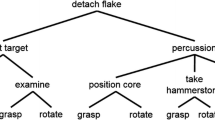Abstract.
From a theoretical point of view, addressing the adoption of novelty and change in consumption is a topic of major interest since it challenges the axiomatic foundations of modern microeconomics. Starting from the “continuity hypothesis” which considers the evolution of culture to be based on biological evolution, an evolutionary approach is presented which highlights the role of consumer learning. By means of a case study on the complex consumption history of sweeteners, it is shown that this approach complements the Lancasterian characteristics approach to the adoption of novelty in consumption in a fruitful way.
Similar content being viewed by others
Author information
Authors and Affiliations
Corresponding author
Additional information
JEL Classification:
B52, D11, D12, Q13
The author thanks Guido Buenstorf, Klaus Rathe and Ulrich Witt for helpful discussions and comments.
Rights and permissions
About this article
Cite this article
Ruprecht, W. The historical development of the consumption of sweeteners - a learning approach. J Evol Econ 15, 247–272 (2005). https://doi.org/10.1007/s00191-005-0253-0
Issue Date:
DOI: https://doi.org/10.1007/s00191-005-0253-0




